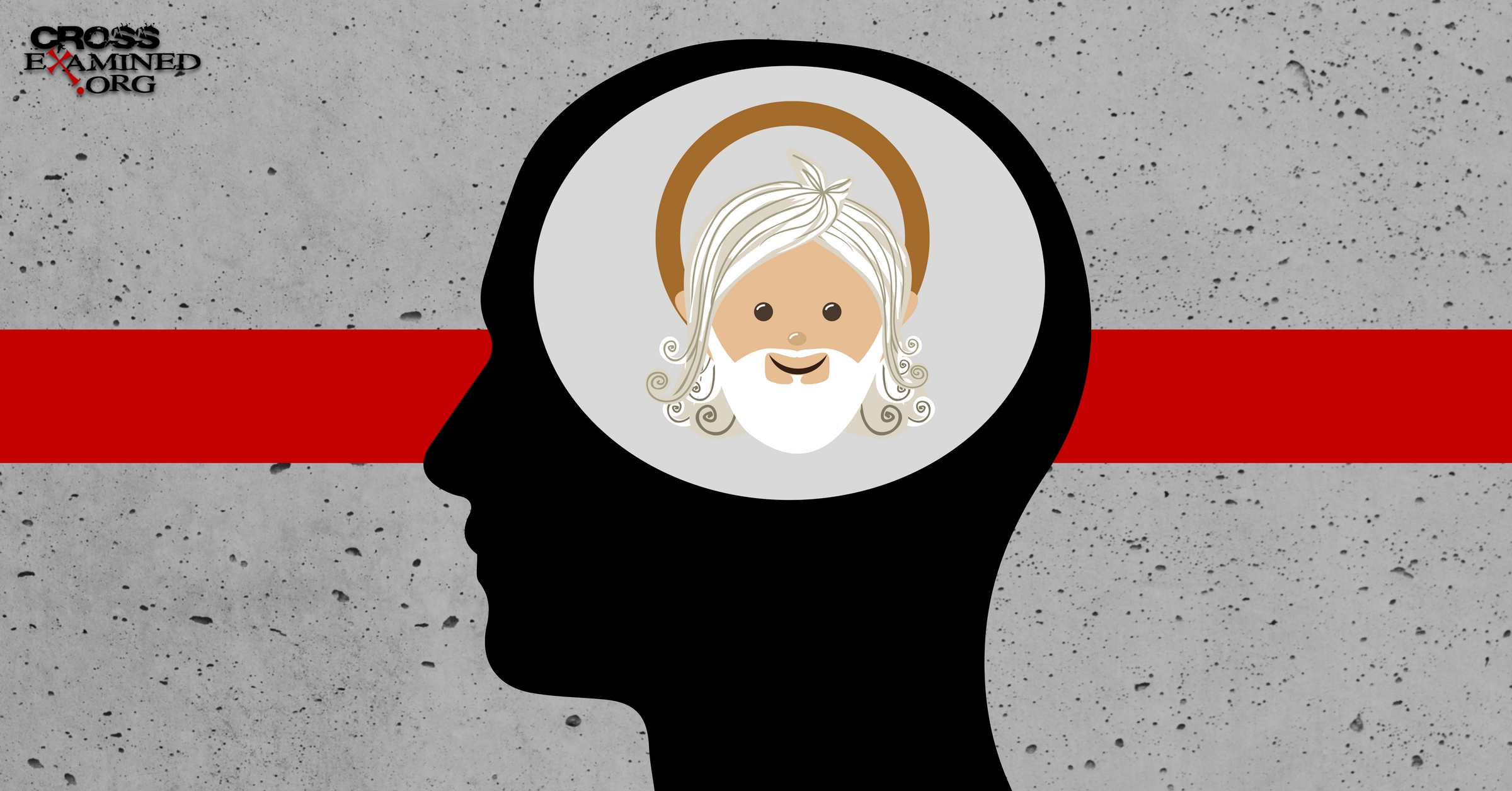Did Man Invent God?
I have recently become aware of a video on the internet that is making its way around the campus of the local university. Several college students told me that after viewing the video, it really made them question their faith. Now, this might surprise you, but I am all for questioning one’s faith (I encourage atheists to do the same), but if one is to question what they believe, it should be for good and logical reasons!
In my experience, it is usually Christians who present arguments utilizing the laws of logic with premises that lead to deductive conclusions. Most (not all) of the atheist arguments I find on the Internet are usually based in emotion as opposed to logic, and therefore, they rarely put their thoughts into logical argument form. After watching this video, I decided to put the statements of this atheist into a deductive syllogism. Let’s see if it is a logically valid argument or not.
1- According to the Bible, God has always existed and predates the universe itself.
2- According to the evidence, the idea of God began evolving 14,000 years ago.
3- Therefore, God has not always existed since man invented the idea of God, the Bible is false and atheism is true.
Now the first two premises are direct quotes from the atheist in the video. Let’s quickly examine them. Premise (1) is true. The Bible does teach that God exists necessarily, eternally with no beginning, and that God brought all things into being (including the universe). Here are two verses from the Old Testament and two from the New Testament to consider:
Genesis 1:1 “In the beginning, God created the heavens and the earth” (Hebrew for universe).
Psalm 148: 1-5 “Praise him, you highest heavens and you waters above the skies. Let them praise the name of the Lord, for at his command they were created.”
John 1:1-3 “In the beginning was the Word (Jesus), and the Word was with God, and the Word was God. He was in the beginning with God. All things were made through him, and without him was not anything made that was made.”
Colossians 1:15-17 “He is the image of the invisible God, the firstborn of all creation. For by him all things were created, in heaven and on earth, visible and invisible, whether thrones or dominions or rulers or authorities – all things were created through him and for him.”
However, this proposition is not only “according to the Bible.” In fact, a logic-based argument that is supported by scientific data suggests the exact same thing! This is known as The Kalam Cosmological Argument. Moreover, arguments such as the Leibnizian Cosmological Argument and the Ontological Argument also logically conclude the same. The Kalam and Leibnizian arguments both rationally infer that there is ONE timeless, beginningless, eternal, necessary, spaceless, immaterial, volitional and personal mind that the universe (and all of its contents) is contingent upon. What is more, the Ontological Argument demonstrates that a Maximally Great Being exists and therefore, monotheism must be true as it is incoherent to have multiple “maximally great beings.”
So, yes, the Bible does make these monotheistic claims; however, even if the Bible didn’t exist, we would still come to these conclusions by thinking according to the laws of logic and the rules of rationality. Since the Bible makes claims that are in line with the laws of logic, it ought to be considered as a plausible explanation of reality. So far the argument is good, because premise (1) is true and is backed up by the laws of logic and modern science. Let’s look at the second premise:
(2) According to the evidence, the idea of God began evolving 14,000 years ago.
This is a controversial premise that historians can argue; however, I am not interested in attacking the supposed “evidence” this atheist thinks he has; rather, I am interested in arguing logically. So for the sake of argument, I will actually grant this premise (I’m not affirming it at all). Here’s the big question: Since I affirm the first premise and grant the second, does the conclusion follow? No, it does not follow because although the premises may be true, the argument is invalid because the conclusion does not logically follow from the two premises. Let’s look at the conclusion again:
(3)Therefore, God has not always existed since man invented the idea of God, the Bible is false and atheism is true.
Premise (2) seems to assume that if we can show why or how humanity started believing that God exists, then, we can logically conclude that these theistic beliefs are false. However, this line of thinking makes a big mistake in reasoning called the genetic fallacy. This mistake is made when someone argues against a proposition by pointing out why someone believes the proposition is true. While it is correct that people can believe propositions for bad reasons, it does not logically follow that the propositions they affirm are therefore false.
The truth or falsity of a proposition is independent of how or why someone came to believe the proposition.
For example, atheistic naturalists believe that all that exists is nature, and therefore, they hold that everything is determined by the laws of nature and past events receding all the way back to the initial conditions of the big bang (this includes all of our thoughts, beliefs, and actions). So, if I told an atheistic naturalist that the only reason he believes in atheism, naturalism and determinism is because he was determined by physics and chemistry to do so, and therefore, these positions are false, I would be committing the genetic fallacy. My objection does not show that the naturalist’s beliefs are false, they only show that he cannot rationally affirm his beliefs and therefore his beliefs do not count as knowledge (a.k.a. justified true belief). The determinist’s belief that determinism is true could luckily happen to be true, even if he does not have reason, warrant, or justification in affirming his propositions.
Back to the argument in question: the atheist is assuming that human ideas about God evolved from pantheistic ones a relatively short and finite time ago. He argues that these are not good reasons to believe in Christian monotheism, and therefore, Christianity is false. His entire argument is based on the genetic fallacy and therefore the whole thing must be discarded as any argument based on a logical fallacy is no argument at all. He claims we have come to believe Christian monotheism is true for bad reasons; therefore, Christian monotheism is false. However, the objective truth-value of the propositions of Christianity is true or false regardless of how we came to hold these beliefs. Remember the other arguments I listed above are good reasons to think monotheism is true independent of what the Bible does or does not say. These arguments are used without touching the Bible and only rely on the laws of logic with support from scientific data. Therefore, in regards to the Bible’s claims about monotheism, it is exactly right and in line with the rules of reason. Moreover, these arguments also prove the negation of this atheist’s invalid conclusion – atheism is therefore, false!
Premise (2) is not only controversial, but it implies the propositions Christians affirm are false because of how we came to hold these beliefs. Let me reiterate this again for the sake of clarity: This commits the genetic fallacy, and therefore, this entire argument is invalid.
One last thing: this video only attacked the Old Testament’s views of God. It is important for Christians (and non-Christians alike) to realize that the truth of “mere” Christianity requires only two key ingredients: 1- God’s existence, and 2- the resurrection of Jesus. That’s it! We don’t even need the Old Testament to reach the conclusion that Christianity is true (logically speaking). I’m glad we have it and it helps make sense of many things, but we don’t need it to conclude Christianity is true. Therefore, any attacks on it, or its infallibility, are completely impotent if their hope is to demonstrate Christianity is false. To do that, one must either demonstrate one of the two premises in the following argument to be false, or that the conclusion does not logically follow deductively from them:
1- God exists.
2- God raised Jesus from the dead.
3- Therefore, Christianity is true.
Premise (1) is reached by a cumulative case of logical arguments such as:
– The Kalam
– The Leibnizian Cosmological Argument
– The Moral Argument
– The Ontological Argument
– The Teleological Argument
– (And many more)
Premise (2) is reached via the historical method and inference to the best explanation. If God raised Jesus from the dead, it seems that God is validating everything that Jesus said, taught, and exemplified. Therefore, Christianity is true!
For more on some of these specific arguments, start here:
http://www.reasonablefaith.org/does-god-exist-1
Stay reasonable (Phil 4:5)
Original Blog Resource: http://bit.ly/2mYIUGf












Leave a Reply
Want to join the discussion?Feel free to contribute!